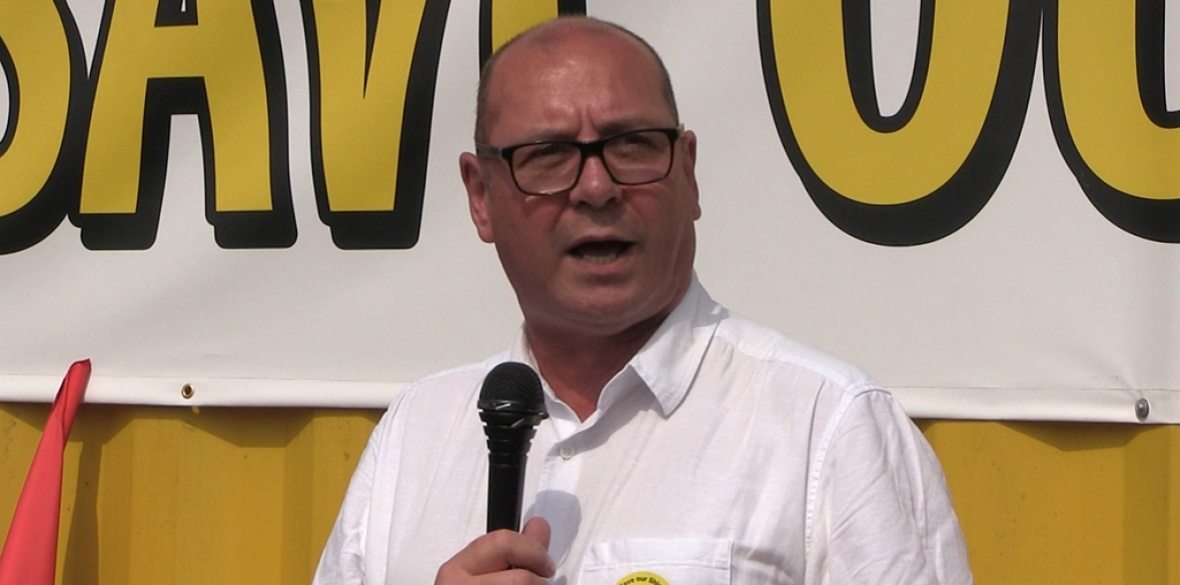This is the last article you can read this month
You can read more article this month
You can read more articles this month
Sorry your limit is up for this month
Reset on:
Please help support the Morning Star by subscribing here
TODAY, Friday November 5, alongside our Scottish regional secretary Pat Rafferty, I am co-hosting the latest in a series of regional meetings to discuss Unite’s Manufacturing Matters industrial strategy.
We’re bringing together shop stewards and officers from Scotland’s manufacturing heartlands to develop our campaign plan to protect vital jobs, skills, investment and income for families and communities facing unprecedented challenges.
Our event takes place in a rapidly changing environment, with lockdowns and forced business closures, introduced to varying degrees by both the Scottish and British governments, impacting on the jobs and livelihoods of millions of workers. With no industrial strategy or plan to support British manufacturing the Tories in Westminster shamefully sit idly by as infrastructure contracts are lost to overseas bids, alongside opportunities for coming generations and vital skills for our recovery.
Disgracefully failing Scottish economic and political interests, both governments have refused to ensure that the benefits from major infrastructure projects like the Neart na Gaiothe (NnG) and Seagreen 1 offshore wind farms deliver work, investment and support for local manufacturers such as BiFab.
Worse still, the SNP-led Scottish government has now withdrawn financial guarantees provided to support the Scottish manufacturer following the collapse of a deal between EDF and BiFab, and BiFab’s failure to secure work from the Seagreen project.
As with the promise of new bus fleets to clean our city air, high speed cable to drive our home internet and turbines to power our energy needs, it seems Scottish manufacturers like BiFab and Alexander Dennis (ADL) and the thousands of people whose livelihoods rely on them, will not be core to Boris Johnson’s promise to Build Back Better.
Successive Tory government interventions have failed because there is no coordinated strategy across nations and sectors to deliver a low carbon economy. It’s not lost on our stewards at ADL, currently battling over 700 redundancies, that Tories’ talk of putting thousands of low emission green buses on our streets is little more than meaningless rhetoric without secure orders being placed.
With thousands of further manufacturing jobs being lost across the economy, from 700 at Rolls Royce Inchinnan to some 350 at Bilfinger, urgent action beyond soundbites is needed to stop irreparable damage.
Desperately needed financial support for essential public services depends on wider support for manufacturing jobs, long-term investment in developing technologies and the export of high value goods and services. Without our manufacturing heartlands being central to any political and economic plan to recover, a deep and damaging recession looms, with mass unemployment, growing poverty and hollowed out communities ripping the heart from our nations.
Beyond the immediacy of Covid-19, the joint challenges of a failure to secure a good agreement on future trade with the European Union and climate change require a complete reshaping of our economy if they’re to be met head on.
The Scottish government has shown it is prepared to go beyond Westminster, from its positive response to pressure from Unite to support domestic PPE procurement and nationalising the Ferguson shipyard in Port Glasgow, to taking a 28 per cent equity stake in BiFab to save it from closure, although it now appears to be walking away from that investment just as the Seagreen project looks to construct a 114-turbine wind farm off the Angus coast.
This, alongside the NnG development, has the potential to sustain hundreds of high-quality green jobs in Scotland, but instead the turbines will be built in Denmark.
Similarly, while blades for the turbines are expected to be built at the mothballed Vestas factory on the Isle of Wight, a mixed build could have seen jobs supported across Britain along with much needed investment and the development of world-class technologies, positioning Britain as a world leader in wind energy generation.
The approach taken to building the new Royal Navy aircraft carriers, which were block built across six shipyards from Rosyth to Portsmouth, should serve as a precedent.
As Seagreen demonstrates, Scotland may be the world’s sixth largest producer of wind power but there can be no “green recovery” if public money is going into the pockets of energy giants, private financiers and sovereign wealth funds. Such public investment, and equity stakes, must be leveraged to create and sustain jobs.
The need to grasp these opportunities is made all the more urgent by the crisis hitting Scotland’s oil and gas industry, which supports 101,000 jobs. Unite is part of the Offshore Co-ordinating Group (OCG), which warned at the start of the pandemic that 3,500 workers were immediately at risk through redundancy or furloughing as the price of oil fell to $20 a barrel, down from $70 in 2019.
The OCG questions whether the industry can be sustained when dramatic fluctuations in activity are driven by the major oil companies pulling the plug the moment things get tough, making significant investments in green energy developments without taking workers or communities with them.
Our Manufacturing Matters strategy calls for urgent investment in projects to sustain jobs and valuable skills, changes to corporate governance and industrial democracy.
If we’re to succeed in meeting the challenges we face, both Westminster and Holyrood must be forced to put working people and our communities centre stage, with trade unions at the table. That’s our challenge and our strategy lays out a clear route to meet it.












